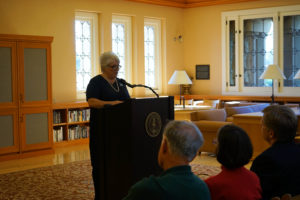On Tuesday, former foreign minister of Estonia Marina Kaljurand came to campus to discuss causes for both hope and worry as Estonia moves forward from its 25th anniversary of restored independence from the Soviet Union.
In the Bender Room in Green Library, Kaljurand spoke with pride and optimism about her country’s role in global affairs and its growth as a proactive democracy.
“What has been most important in Estonia is regaining its position globally,” Kaljurand said, later calling Estonia the “most integrated state in Europe” in terms of its involvement in international organizations.
According to Kaljurand, this integration stems especially from Estonia’s membership in the European Union and NATO. Estonia is also becoming more involved on the global stage by running to become a nonpermanent member of the United Nations Security Council from 2020 to 2021.
Kaljurand stressed that Estonia’s membership in these organizations is about more than mere presence; it is about having a voice in what issues receive global attention, as Lithuania did when it forced greater emphasis on the Crimean occupation while it was on the Security Council a few years ago.
“We are committed to our part in defending Europe because we know what solidarity means,” Kaljurand said. “We’ve learned from history that we need to be together to solve problems.”
Those themes of international cooperation and security received particular attention in her talk because Estonia and other small Baltic countries have faced a number of threats from Russia in recent years. Kaljurand asserted that Russia’s violations are unacceptable dangers to the democracy that Estonia has worked so hard to achieve. She also emphasized her support for any nation that wishes to carry out democratic reform.
“Democracy must be cherished and protected, and if needed, fought for,” Kaljurand said. “One country can’t change international law or order, but one country can challenge or undermine it. Russia is challenging our vision of Europe — whole, free and at peace.”

Discussion then turned to how Russia’s aggression has been dealt with thus far. Kaljurand expressed great faith in the efficacy of the current sanctions and non-recognition of Russian-occupied Crimea, partly because non-recognition of the Soviet regime in Estonia was a cornerstone of Estonia’s eventual independence and reform efforts. At the same time, the former minister stated that Estonia must be prepared for possible aggression.
“People in Estonia are not thinking much about possible military attack, but we have to be prepared for military provocations,” she said.
Other major topics of Kaljurand’s talk included terrorism and the immigration crisis. Kaljurand said that last year’s terrorist attacks on Paris and later Nice and Brussels were especially difficult for her and her country, partly because the Nice victims included two Estonians.
“The attacks reminded us that terrorists feel no mercy for anyone or anything,” Kaljurand said. “Nothing can justify terrorism and we must fight it globally, and Estonia is part of that global network.”
On the matter of immigration, Kaljurand elaborated upon Estonia’s current policy. Estonia willingly accepts up to 6,000 foreigners each year and has also agreed to take 500 refugees from Syria. However, Kaljurand said that the process of incorporating migrants and refugees is a complex, long-term process that must be carried out responsibly.
She also implored the audience to adopt a more informed perspective of Europe’s response to the current immigration crisis, reminding the crowd that the number of migrants and refugees the region received last year accounted for less than half a percent of the European population.
Kaljurand went on to highlight Estonia’s positive relationship with the United States, citing Estonia’s gratitude for the harsh stance that the U.S. government has taken on Russian violations and for President Obama’s assurance that the U.S. will come to Estonia’s aid in the case of Russian aggression.
On the whole, Kaljurand expressed great optimism for Estonia, even as both internal and external factors threaten its security.
“Never before since the restoration of Estonian independence has war been so close to our borders or have we been subject to terrorist attacks,” Kaljurand said. “But I’m confident that our future is bright and that we can do great things in the world.”
Estonian native Sten Tamkivi MSM ’14, a graduate of the School of Business, was impressed with the talk.
“It’s great to hear from such a visible diplomat who is getting very involved with both internal and international politics,” Tamkivi said. “She’s quite a character, and she has very clear and articulate views on what is happening in Estonia and in the world, which are very important for us today.”
Contact Lucy Arnold at lucywa20 ‘at’ stanford.edu.
